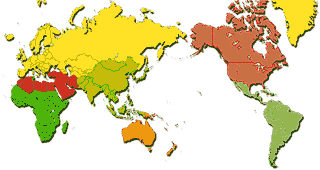 THE GODS MUST BE CRAZY
THE GODS MUST BE CRAZY
There was something in the air here last night, the energy was just crackling in the streets. I stopped by City for my daily dose of humans. I was later than usual for a Saturday night, my regular buddies were already gone. I found myself sitting next to Jeremy. He's been showing up across the bar in the after-work crowd just recently. I've been curious about him. He always has a stack of papers with him.
We had a great conversation and I was happy to find one other person besides Roger who I'll be able to discuss politics with. Turns out he is a teacher who is also working on a documentary for the
Media Education Foundation. This project is based right in lovely downtown Northampton, a few blocks from me. They're doing good work over there and I've been meaning to get in contact with them for a while. Glad they finally found me.
Jeremy left and I was immediately joined by a new companion - Ed. I found it somewhat cosmic that Ed works for the local Coca-Cola plant. I had just posted a long screed on the corporate environment in response to Bob Armstrong, earlier in the day. Here was chance to test my theory. Unfortunately, I was all too right.
Ed was stone cold sober when he sat down. He looked to be about mid-30s, shaved head, clean and dressed conservatively. He used to drive a truck. He loved the job but he hated the hours. He had no life outside of the road. So he joined corporate Amerika.
He was pretty proud of his job. He works in the lab at the bottling plant. He described himself as a blue collar worker and thought he had a pretty good deal working for $17 an hour since he was only a high school graduate. He spouted a lot of corporate slogans. He felt secure in his job. He didn't know anyone in corporate headquarters. He doesn't even know anyone in the local HQ. Then I asked him what it was like to live under the corporate rules of employment.
He morphed into a whole different personality. He was wired for sound and he got louder and louder. He had finished half his beer. He started to scare me. This was the effect of seven years of having been treated like a statistic instead of a human being. I shrugged my shoulders at Roger in silent apology and booked out of there. I don't always like being right.

I ran into Al of the
Drunkstuntmen at the convenience store an hour later. He was on his way to Harry's to do an acoustic set with fellow bandmate Steve. I caught the end of the set. These boys are some of the most versatile players in this town and I've seen them in a lot of different combinations, but the duo really works. Al's guitar sounds better everytime I see him, he doesn't get to show his licks in the full band, and Steve lyrics as always sear the brain even as his voice soothes the soul. The hot gossip straight from the stage though is that Bow Bow is leaving the group and they are looking for a new bass player. Hard to imagine the band without him.
 CARD CARRYING MEMBER
CARD CARRYING MEMBER
The
ACLU College Freedom Tour is coming to Amherst on Tuesday and much to my delight
Barry Crimmins will be exercising his First Amendment rights as the evening's host. I love his wit and since I am half of the WMASS Regional office of the ACLUM, it appears I'll have an opportunity to meet one of my counter-culture heros. The event starts at 7:00 and is free to the public. There will be talking, music and a short film. Come on down to Bowker Auditorium at UMASS and get your awareness radically raised.
 DISCUSSION
DISCUSSION
The debate on corporate complicity continues unabated.
Bob Armstrong did indeed answer the next day and in the interests of free expression, I post his response with my replies. This is my last attempt to convince him that the Libertarians need to change their view on this point, before they get my vote.
This is really long so I'm going to post it in installments. I know it seems like a stretch to relate this to the WODSU, but it's part of the problem. The power of the corporate influence is greater than governments and they are behind the policies that keep only certain drugs illegal. Think about this, the
combined net worth of the Walton family (66bil) - they own WalMart - is significantly greater than the GNP of either Iraq(58bil) or Afganistan(19bil), the last two countries we invaded.
With that in mind, I give Part I of the Great Libby-terian Debate. Bob's remarks will be in bold:
The defense is of the principle of non initiation of aggression . Which implies no preemptive interference by a third party with rights of individuals to "make business" , to use Yasir Arafat's phrase , with counterparties of their choice . We fail to see a distinction between a snack shop owner offering a meal to a homeless person for wearing a sandwich board for forty minutes and the heads of the enormous coordinated teams it take to create much of flows of products necessary for modern existence .
There's a huge difference. The sandwich guy is a community based business providing a tangible good and personal service. He probably knows a lot of his
patrons by name. If he's rude or his food is bad, his patrons will go to Jack's Joint down the street. I doubt his business plan includes trying to eliminate Jack's and the other four snack shops in his neighborhood with a hostile takeover. He's following your model by trying to provide a better product.
He also provides a social service by employing the homeless guy and I bet he knows his name also. The guy leaves with a full belly and his dignity for having been afforded a chance to earn his meal with honest labor instead of having to commit some petty crime for his sustenance.
In contrast, the heads of, as you say, these enormous teams required to coordinate the flow of products, are actually producing nothing. They are shuffling paper and planning preemptive attacks on under-exploited markets. It's all about the velocity of money - they don't give a damn about the quality of their product, they care about the quantity of their profit.
These guys don't know one patron's name, hell they don't know their employee's names. I feel very certain they not only don't know the homeless guy's name but would drive right by him on the street and not even really see him.
Their business plan is to eliminate choices, not participate in or facilitate free, much less fair trade. They undermine the local guy with the force of their buying power which occurred because they were allowed to grow so large as to swallow the competition whole.
The only force that a "corporation" of any size can use is to supply some good or service that many individuals choose as a better value proposition than any of their alternatives. For instance, you have to operate a damned unique hardware store offering some distinct advantage to some niche of customers if you don't want to become a department head in hardware in the local Home Depot . People will vote with their dollars (or rather with the dollars they save) for the operation with the greater efficiencies and correspondingly lower costs.
The consumers don't have a choice. They have to choose between saving money and paying for their prescription drugs. Using your hardware store analogy, when these big box retailers come in and drive the little guy out of business, they put his employees out of work. Sure they can now get a job there but it's to the detriment of their well-being.
Mr. Big Box CEO doesn't care if his kids are sick or his truck died on the way to work. He is not treated like a human being, he is a statistic, subject to a set of inflexible rules whose sole criteria is profit. They probably only gave him a part-time position and they schedule to the max of the limits before they have to offer him benefits. Those cost money too you know.
So yeah, he's going to buy his stuff there to save 10 bucks over what it would cost to buy the same thing at the last remaining independent merchant in town. He doesn't really have a choice. He still has to feed his family.
 Quote of the Day
Quote of the Day
Last word goes to Barry Crimmins, who has this to say on corporate ownership of our government:
All money reflects is the ownership of the candidate. If Bush were a racing car he'd have more corporate logos on him than the rest of his competitors combined. He'd also wear other logos that represent authoritarianism, environmental destruction, religious zealotry, bigotry, unbridled greed and imperialism.
 ANOTHER STORMY MONDAY
ANOTHER STORMY MONDAY
 RED ALERT
RED ALERT
 WANT TO KNOW A SECRET?
WANT TO KNOW A SECRET?
 QUOTE OF THE DAY
QUOTE OF THE DAY
 THE GODS MUST BE CRAZY
THE GODS MUST BE CRAZY
 I ran into Al of the
I ran into Al of the  CARD CARRYING MEMBER
CARD CARRYING MEMBER
 DISCUSSION
DISCUSSION
 Quote of the Day
Quote of the Day
 WORD GAMES
WORD GAMES
 WILD ABOUT HARRY
WILD ABOUT HARRY
 CRUEL AND UNUSUAL PUNISHMENT
CRUEL AND UNUSUAL PUNISHMENT
 BE AFRAID, BE VERY AFRAID
BE AFRAID, BE VERY AFRAID
 IT'S IN THE STARS
IT'S IN THE STARS
 GOT MY MOJO WORKING
GOT MY MOJO WORKING
 REMOTE CONTROL
REMOTE CONTROL
 MISSING BOBBY KENNEDY
MISSING BOBBY KENNEDY
 JUST WAITING ON A FRIEND
JUST WAITING ON A FRIEND
 WE ARE THE WORLD
WE ARE THE WORLD
 SAY IT AGAIN SAM
SAY IT AGAIN SAM
 WATER, WATER EVERYWHERE
WATER, WATER EVERYWHERE
 SWEET LIBERTY
SWEET LIBERTY
 OFF WITH THEIR HEADS
OFF WITH THEIR HEADS
 CAUSE AND EFFECT
CAUSE AND EFFECT
 NEWS OF THE NORTH
NEWS OF THE NORTH
 LIFE IN THE FAST LANE
LIFE IN THE FAST LANE
 LETTER TO THE EDITOR
LETTER TO THE EDITOR
 LINK TO ME, LIKE BLOGGERS DO
LINK TO ME, LIKE BLOGGERS DO
 SAVE THE CHILDREN
SAVE THE CHILDREN
 BAD MEDICINE
BAD MEDICINE
 MAD SCIENCE
MAD SCIENCE
 EYE OF A HURRICANE
EYE OF A HURRICANE
 PAYING THE COST
PAYING THE COST  OH THE TANGLED WEBS THEY WEAVE...
OH THE TANGLED WEBS THEY WEAVE...
 THE AYES HAVE IT
THE AYES HAVE IT
 Last word and quote of the day goes to President Lula da Silva, who made this remark during a speech at the end of the WTO trade conference:
Last word and quote of the day goes to President Lula da Silva, who made this remark during a speech at the end of the WTO trade conference:
 STRANGERS ON A TRAIN
STRANGERS ON A TRAIN
 BAD SCIENCE
BAD SCIENCE
 YES WE CANN
YES WE CANN
 STORMY MONDAY
STORMY MONDAY
 HOMETOWN HERO
HOMETOWN HERO
 IT ALL MAKES FISCAL SENSE
IT ALL MAKES FISCAL SENSE
 SIGN OF THE TIMES
SIGN OF THE TIMES
 GARDEN PARTY
GARDEN PARTY
 UP IN SMOKE
UP IN SMOKE
 BYE BYE BIRDIE
BYE BYE BIRDIE
 ALTERED STATES
ALTERED STATES
 LAST ROUND-UP
LAST ROUND-UP
 Columbia Week
Columbia Week
 LAST WORD
LAST WORD
